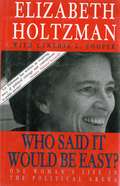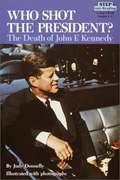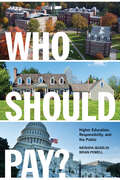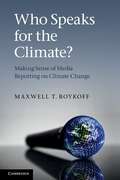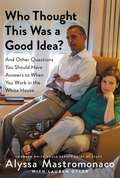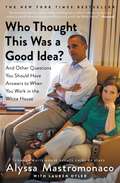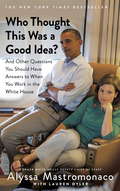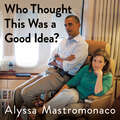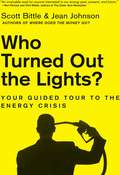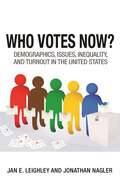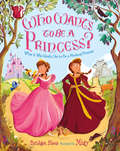- Table View
- List View
Who Rules America?: The Corporate Rich, White Nationalist Republicans, and Inclusionary Democrats in the 2020s
by G William DomhoffAt this crucial moment in American history, when voting rights could be expanded to include all citizens, or legislatively limited, this significantly updated edition of Who Rules America? shows precisely how the top 1% of the population, who own 43% of all financial wealth, and receive 20% of the nation’s yearly income, dominate governmental decision-making. They have created a corporate community and a policy-planning network, made up of foundations think-tanks, and policy-discussion groups, to develop the policies that become law. Through a leadership group called the power elite, the corporate rich provide campaign donations and other gifts and favors to elected officials, serve on federal advisory committees, and receive appointments to key positions in government, all of which make it possible for the corporate rich and the power elite to rule the country, despite constant challenges from the inclusionary alliance and from the Democratic Party. The book explains the role of both benign and dark attempts to influence public opinion, the machinations of the climate-denial network, and how the Supreme Court came to have an ultraconservative majority, who serve as a backstop for the corporate community as well as a legitimator of restrictions on voting rights, union rights, and abortion rights, by ruling that individual states have the power to set such limits. Despite all this highly concentrated power, it will be the other 99.5%, not the top 0.5%, who will decide the fate of the United States in the 2020s on all the important issues.
Who Rules the World?
by Noam ChomskyA New York Times Bestseller <p><p> The world’s leading intellectual offers a probing examination of the waning American Century, the nature of U.S. policies post-9/11, and the perils of valuing power above democracy and human rights <p> In an incisive, thorough analysis of the current international situation, Noam Chomsky argues that the United States, through its military-first policies and its unstinting devotion to maintaining a world-spanning empire, is both risking catastrophe and wrecking the global commons. Drawing on a wide range of examples, from the expanding drone assassination program to the threat of nuclear warfare, as well as the flashpoints of Iraq, Iran, Afghanistan, and Israel/Palestine, he offers unexpected and nuanced insights into the workings of imperial power on our increasingly chaotic planet. <p> In the process, Chomsky provides a brilliant anatomy of just how U.S. elites have grown ever more insulated from any democratic constraints on their power. While the broader population is lulled into apathy―diverted to consumerism or hatred of the vulnerable―the corporations and the rich have increasingly been allowed to do as they please. <p> Fierce, unsparing, and meticulously documented, Who Rules the World? delivers the indispensable understanding of the central conflicts and dangers of our time that we have come to expect from Chomsky.
Who Rules the World? (American Empire Project)
by Noam ChomskyA New York Times BestsellerThe world’s leading intellectual offers a probing examination of the waning American Century, the nature of U.S. policies post-9/11, and the perils of valuing power above democracy and human rights In an incisive, thorough analysis of the current international situation, Noam Chomsky argues that the United States, through its military-first policies and its unstinting devotion to maintaining a world-spanning empire, is both risking catastrophe and wrecking the global commons. Drawing on a wide range of examples, from the expanding drone assassination program to the threat of nuclear warfare, as well as the flashpoints of Iraq, Iran, Afghanistan, and Israel/Palestine, he offers unexpected and nuanced insights into the workings of imperial power on our increasingly chaotic planet. In the process, Chomsky provides a brilliant anatomy of just how U.S. elites have grown ever more insulated from any democratic constraints on their power. While the broader population is lulled into apathy—diverted to consumerism or hatred of the vulnerable—the corporations and the rich have increasingly been allowed to do as they please. Fierce, unsparing, and meticulously documented, Who Rules the World? delivers the indispensable understanding of the central conflicts and dangers of our time that we have come to expect from Chomsky.
Who Runs?: The Masculine Advantage in Candidate Emergence (The CAWP Series in Gender and American Politics)
by Meredith Conroy Sarah OliverTo explain women’s underrepresentation in American politics, researchers have directed their attention to differences between men and women, especially during the candidate emergence process, which includes recruitment, perception of qualifications, and political ambition. Although these previous analyses have shown that consistent dissimilarities likely explain why men outnumber women in government, they have overlooked a more explicit role for gender (masculinity and femininity) in explanations of candidate emergence variation. Meredith Conroy and Sarah Oliver focus on the candidate emergence process (recruitment, perceived qualifications, and ambition), and investigate the affects of individuals’ gender personality on these variables to improve theories of women’s underrepresentation in government. They argue that since politics and masculinity are congruent, we should observe more precise variation in the candidate emergence process along gender differences, than along sex differences in isolation. Individuals who are more masculine will be more likely to be recruited, perceive of themselves as qualified, and express political ambition, than less masculine individuals. This differs from studies that look at sex differences, because it accepts that some women defy gender norms and break into politics. By including a measure of gender personality we can more fully grapple with women’s progress in American politics, and consider whether this progress rests on masculine behaviors and attributes. Who Runs? The Masculine Advantage in Candidate Emergence explores this possibility and the potential ramifications.
Who Runs Britain?: ...and who's to blame for the economic mess we're in
by Robert Peston'A compelling portrait of early 21st century casino capitalism ... essential reading.' - The Times On 13 September 2007, Robert Peston broke the news that Northern Rock had become a victim of the global credit crunch and was seeking an emergency loan from the Bank of England. It was the latest in a long line of scoops by this award-winning journalist. Over the weeks that followed, the Government found itself exposed to the Rock to the tune of 57 billion, or almost £2000 for every taxpayer.As Robert Peston shows in his fascinating new book, the seeds for the collapse of Northern Rock and the upheavals in the financial markets were sown years before.Who Runs Britain? is the first time anyone has drawn all the threads together to weave a story that's rich in extraordinary characters and outrageous feats of economic bravado. This book is about the widening gap between the super-rich and the rest of us. It explores and explodes the myth that the financial creativity of those who are amassing these vast fortunes is good for the wider economy and for all of us. Whether you're a financial expert or just have a bank account, Who Runs Britain? is a book you must read.
Who Runs Congress?
by Mark GreenThis book offers some practical advice on what you can do about reclaiming the Congress for American citizens.
Who Said It Would Be Easy?: One Woman's Life in the Political Arena
by Elizabeth HoltzmanA tour through America's changing political climate is seen through the career of former U.S. congresswoman Elizabeth Holtzman, the youngest woman ever to be elected to Congress, and shares her personal experiences and theories about modern government.
Who Serves?: The Persistent Myth Of The Underclass Army
by Sue E BerrymanThis book provides an introduction to important socio-political issues and selected demographic data underlying recurrent debates concerning both the mythic and actual social composition and quality of U.S. enlisted forces
Who Shot the President?
by Judy DonnellyExamines events surrounding the assassination of President Kennedy in 1963. Also discusses the Warren Commission findings and conspiracy theories.
Who Should Pay? Higher Education, Responsibility, and the Public: Higher Education, Responsibility, and the Public
by Natasha Quadlin Brian PowellAmericans now obtain college degrees at a higher rate than at any time in recent decades in the hopes of improving their career prospects. At the same time, the rising costs of an undergraduate education have increased dramatically, forcing students and families to take out often unmanageable levels of student debt. The cumulative amount of student debt reached nearly $1.5 trillion in 2017, and calls for student loan forgiveness have gained momentum. Yet public policy to address college affordability has been mixed. While some policymakers support more public funding to broaden educational access, others oppose this expansion. Noting that public opinion often shapes public policy, sociologists Natasha Quadlin and Brian Powell examine public opinion on who should shoulder the increasing costs of higher education and why. Who Should Pay? draws on a decade’s worth of public opinion surveys analyzing public attitudes about whether parents, students, or the government should be primarily responsible for funding higher education. Quadlin and Powell find that between 2010 and 2019, public opinion has shifted dramatically in favor of more government funding. In 2010, Americans overwhelming believed that parents and students were responsible for the costs of higher education. Less than a decade later, the percentage of Americans who believed that federal or state/local government should be the primary financial contributor has more than doubled. The authors contend that the rapidity of this change may be due to the effects of the 2008 financial crisis and the growing awareness of the social and economic costs of high levels of student debt. Quadlin and Powell also find increased public endorsement of shared responsibility between individuals and the government in paying for higher education. The authors additionally examine attitudes on the accessibility of college for all, whether higher education at public universities should be free, and whether college is worth the costs. Quadlin and Powell also explore why Americans hold these beliefs. They identify individualistic and collectivist world views that shape public perspectives on the questions of funding, accessibility, and worthiness of college. Those with more individualistic orientations believed parents and students should pay for college, and that if students want to attend college, then they should work hard and find ways to achieve their goals. Those with collectivist orientations believed in a model of shared responsibility – one in which the government takes a greater level of responsibility for funding education while acknowledging the social and economic barriers to obtaining a college degree for many students. The authors find that these belief systems differ among socio-demographic groups and that bias – sometimes unconscious and sometimes deliberate – regarding race and class affects responses from both individualistic and collectivist-oriented participants. Public opinion is typically very slow to change. Yet Who Should Pay? provides an illuminating account of just how quickly public opinion has shifted regarding the responsibility of paying for a college education and its implications for future generations of students.
Who Speaks For The Climate?: Making Sense Of Media Reporting On Climate Change
by Maxwell T. BoykoffThe public rely upon media representations to help interpret and make sense of the many complexities relating to climate science and governance. Media representations of climate issues - from news to entertainment - are powerful and important links between people's everyday realities and experiences, and the ways in which they are discussed by scientists, policymakers and public actors. A dynamic mix of influences - from internal workings of mass media such as journalistic norms, to external political, economic, cultural and social factors - shape what becomes a climate 'story'. <P> Providing a bridge between academic considerations and real world developments, this book helps students, academic researchers and interested members of the public make sense of media reporting on climate change as it explores 'who speaks for climate' and what effects this may have on the spectrum of possible responses to contemporary climate challenges.
Who Speaks for Nature?: On the Politics of Science
by Laura EphraimWhen natural scientists speak up in public about the material phenomena they have observed, measured, and analyzed in the lab or the field, they embody a distinctive version of political authority. Where does science derive its remarkably resilient, though often contested, capacity to give voice to nature? What efforts on the part of scientists and nonscientists alike determine who is regarded as a legitimate witness to material reality and whose speech is discounted as idle chatter, mere opinion, or noise?In Who Speaks for Nature?, Laura Ephraim reveals the roots of scientific authority in what she calls "world-building politics": the collection of practices through which scientists and citizens collaborate with and struggle against each other to engage natural things and events and to construct a shared yet heterogeneous world. Through innovative readings of some of the most important thinkers of science and politics of the near and distant past, including René Descartes, Thomas Hobbes, Giambattista Vico, and Hannah Arendt, Ephraim argues that the natural sciences are political because they are crucial sites in which the worldly relationships that bind together the human and nonhuman are inherited, augmented, and reconstructed.Who Speaks for Nature? opens a novel conversation between political theory, science, and technology studies and augments existing efforts by feminists, environmentalists, and democratic theorists to challenge the traditional binary separating nature and politics. In an age of climate change and climate-change denial, Ephraim brings theoretical understandings of politics to bear on real-world events and decisions and uncovers fresh insights into the place of scientists in public life.
Who Speaks for the Poor: National Interest Groups and Social Policy (Politics and Policy in American Institutions)
by Richard A. HaysThis book addresses the central question of how the interests of the poor gain representation in the political process by examining the interest group system.
Who Speaks for the Poor?: Electoral Geography, Party Entry, and Representation (Cambridge Studies in Comparative Politics)
by Karen Long JuskoWho Speaks for the Poor? explains why parties represent some groups and not others. This book focuses attention on the electoral geography of income, and how it has changed over time, to account for cross-national differences in the political and partisan representation of low-income voters. Jusko develops a general theory of new party formation that shows how changes in the geographic distribution of groups across electoral districts create opportunities for new parties to enter elections, especially where changes favor groups previously excluded from local partisan networks. Empirical evidence is drawn first from a broadly comparative analysis of all new party entry and then from a series of historical case studies, each focusing on the strategic entry incentives of new low-income peoples' parties. Jusko offers a new explanation for the absence of a low-income people's party in the USA and a more general account of political inequality in contemporary democratic societies.
Who Speaks for You?: The Inside Story of the Prosecutor Who Took Down Baltimore's Most Crooked Cops
by Leo WiseThe true story of how federal law enforcement flipped the playbook and convicted a corrupt unit of Baltimore police.In 2015 and 2016, Baltimore was reeling after the death of Freddie Gray in police custody and the protests that followed. In the midst of this unrest, a violent, highly trained, and heavily armed criminal gang roamed the city. They robbed people, sold drugs and guns, and divided the loot and profit among themselves. They had been doing it for years. But these were not ordinary career criminals. They were the Baltimore Police Department's Gun Trace Task Force (GTTF). Formed in 2007 to get the guns and criminals responsible for Baltimore's high crime rates off the streets, they went rogue and abused their power to terrorize people throughout the city. On March 1, 2017, all members of the GTTF were arrested on federal racketeering charges. In Who Speaks for You?, Leo Wise, the lead federal prosecutor in the case, tells you how. Wise gives an inside look into the investigation and prosecution of this group of elite and corrupt cops. He shares the unbelievable twists and turns of the case, revealing not only what these officers did but how they were brought to justice. Wise dramatically recounts how his team put together their case, what happened during the trial and court proceedings, and how his team successfully prosecuted these extraordinary defendants. This is the firsthand story of a once-in-a-generation police corruption case told by the prosecutor who was intimately involved in every step of the investigation.
Who Stole the American Dream?
by Hedrick SmithPulitzer Prize winner Hedrick Smith's new book is an extraordinary achievement, an eye-opening account of how, over the past four decades, the American Dream has been dismantled and we became two Americas. In his bestselling The Russians, Smith took millions of readers inside the Soviet Union. In The Power Game, he took us inside Washington's corridors of power. Now Smith takes us across America to show how seismic changes, sparked by a sequence of landmark political and economic decisions, have transformed America. As only a veteran reporter can, Smith fits the puzzle together, starting with Lewis Powell's provocative memo that triggered a political rebellion that dramatically altered the landscape of power from then until today. This is a book full of surprises and revelations--the accidental beginnings of the 401(k) plan, with disastrous economic consequences for many; the major policy changes that began under Jimmy Carter; how the New Economy disrupted America's engine of shared prosperity, the "virtuous circle" of growth, and how America lost the title of "Land of Opportunity." Smith documents the transfer of $6 trillion in middle-class wealth from homeowners to banks even before the housing boom went bust, and how the U.S. policy tilt favoring the rich is stunting America's economic growth. This book is essential reading for all of us who want to understand America today, or why average Americans are struggling to keep afloat. Smith reveals how pivotal laws and policies were altered while the public wasn't looking, how Congress often ignores public opinion, why moderate politicians got shoved to the sidelines, and how Wall Street often wins politically by hiring over 1,400 former government officials as lobbyists. Smith talks to a wide range of people, telling the stories of Americans high and low. From political leaders such as Bill Clinton, Newt Gingrich, and Martin Luther King, Jr., to CEOs such as Al Dunlap, Bob Galvin, and Andy Grove, to heartland Middle Americans such as airline mechanic Pat O'Neill, software systems manager Kristine Serrano, small businessman John Terboss, and subcontractor Eliseo Guardado, Smith puts a human face on how middle-class America and the American Dream have been undermined. This magnificent work of history and reportage is filled with the penetrating insights, provocative discoveries, and the great empathy of a master journalist. Finally, Smith offers ideas for restoring America's great promise and reclaiming the American Dream. "Hedrick Smith has done it again! Who Stole the American Dream? provides a readable and comprehensive account of how Americans have been robbed of our dream of a broad middle class over the past forty years. It is essential reading."--Jay W. Lorsch, the Louis E. Kirstein Professor of Human Relations, Harvard Business School
Who Stole the Town Hall?: The End of Local Government as We Know It
by Peter LathamIn this provocative new book, Peter Latham argues that the UK Conservative Government’s devolution agenda conceals their real intention: to complete the privatisation of local government and other public services. Using illustrative examples from across the UK, including the so-called ‘Northern Powerhouse’ and the Midlands, the book explains the far-reaching implications of the reorganisation of local government that is already affecting vital public services, including education, health, housing and policing. Proposing an overhaul of the taxation system to include land value taxation, a wealth tax and more progressive income tax to fund an increase in directly provided services, the author argues that a new basis for federal, regional and local democracy is vital.
Who Thought This Was a Good Idea?
by Alyssa Mastromonaco Lauren Oyler<P>Alyssa Mastromonaco worked for Barack Obama long before he began his campaign for president. In this book, Alyssa shares the strategies that made her successful in politics and the White House - including the importance of confidence, the value of not being a jerk, and why ultimately everything comes down to hard work (and always carrying a spare tampon). <P><b>A New York Times Bestseller</b>
Who Thought This Was a Good Idea?: And Other Questions You Should Have Answers to When You Work in the White House
by Alyssa Mastromonaco Lauren OylerNow a New York Times bestseller! If your funny older sister were the former deputy chief of staff to President Barack Obama, her behind-the-scenes political memoir would look something like this...Alyssa Mastromonaco worked for Barack Obama for almost a decade, and long before his run for president. From the then-senator's early days in Congress to his years in the Oval Office, she made Hope and Change happen through blood, sweat, tears, and lots of briefing binders.But for every historic occasion-meeting the queen at Buckingham Palace, bursting in on secret climate talks, or nailing a campaign speech in a hailstorm-there were dozens of less-than-perfect moments when it was up to Alyssa to save the day. Like the time she learned the hard way that there aren't nearly enough bathrooms at the Vatican.Full of hilarious, never-before-told stories, WHO THOUGHT THIS WAS A GOOD IDEA? is an intimate portrait of a president, a book about how to get stuff done, and the story of how one woman challenged, again and again, what a "White House official" is supposed to look like. Here Alyssa shares the strategies that made her successful in politics and beyond, including the importance of confidence, the value of not being a jerk, and why ultimately everything comes down to hard work (and always carrying a spare tampon).Told in a smart, original voice and topped off with a couple of really good cat stories, WHO THOUGHT THIS WAS A GOOD IDEA? is a promising debut from a savvy political star.
Who Thought This Was a Good Idea?: And Other Questions You Should Have Answers to When You Work in the White House
by Alyssa Mastromonaco Lauren Oyler'Always fascinating and very funny, Alyssa's book is full of juicy stories from one of the world's most glamorous jobs' Mindy KalingIf your funny older sister were the former deputy chief of staff to President Barack Obama, her behind-the-scenes political memoir would look something like this . . .Alyssa Mastromonaco worked for Barack Obama for almost a decade, and long before his run for president. From the then-senator's early days in Congress to his years in the Oval Office, she made Hope and Change happen through blood, sweat, tears and lots of briefing binders.But for every historic occasion - meeting the queen at Buckingham Palace, bursting in on secret climate talks, or nailing a campaign speech in a hailstorm - there were dozens of less-than-perfect moments when it was up to Alyssa to save the day. Like the time she learned the hard way that there aren't nearly enough bathrooms at the Vatican.Full of hilarious, never-before-told stories, Who Thought This Was a Good Idea? is an intimate portrait of a president, a book about how to get stuff done, and the story of how one woman challenged, again and again, what a 'White House official' is supposed to look like. Here Alyssa shares the strategies that made her successful in politics and beyond, including the importance of confidence, the value of not being a jerk, and why ultimately everything comes down to hard work (and always carrying a spare tampon).Told in a smart, original voice and topped off with a couple of really good cat stories, Who Thought This Was a Good Idea? is the brilliantly funny, frank and inspirational memoir from a savvy political star.
Who Thought This Was a Good Idea?: And Other Questions You Should Have Answers to When You Work in the White House
by Alyssa Mastromonaco Lauren Oyler'Always fascinating and very funny, Alyssa's book is full of juicy stories from one of the world's most glamorous jobs' Mindy KalingIf your funny older sister were the former deputy chief of staff to President Barack Obama, her behind-the-scenes political memoir would look something like this . . .Alyssa Mastromonaco worked for Barack Obama for almost a decade, and long before his run for president. From the then-senator's early days in Congress to his years in the Oval Office, she made Hope and Change happen through blood, sweat, tears and lots of briefing binders.But for every historic occasion - meeting the queen at Buckingham Palace, bursting in on secret climate talks, or nailing a campaign speech in a hailstorm - there were dozens of less-than-perfect moments when it was up to Alyssa to save the day. Like the time she learned the hard way that there aren't nearly enough bathrooms at the Vatican.Full of hilarious, never-before-told stories, Who Thought This Was a Good Idea? is an intimate portrait of a president, a book about how to get stuff done, and the story of how one woman challenged, again and again, what a 'White House official' is supposed to look like. Here Alyssa shares the strategies that made her successful in politics and beyond, including the importance of confidence, the value of not being a jerk, and why ultimately everything comes down to hard work (and always carrying a spare tampon).Told in a smart, original voice and topped off with a couple of really good cat stories, Who Thought This Was a Good Idea? is the brilliantly funny, frank and inspirational memoir from a savvy political star.
Who Turned Out the Lights?
by Jean Johnson Scott BittleFrom the editors of PublicAgenda.org, an entertaining, irreverent, and absolutely essential nonpartisan guide to the energy crisis Energy: It's a problem that never goes away (despite our best efforts as a nation to ignore it). Why has there been so much talk and so little action? In Who Turned Out the Lights? Scott Bittle and Jean Johnson offer a much-needed reality check: The "Drill, Baby, Drill" versus "Every Day Is Earth Day" battle is not solving our problems, and the finger-pointing is just holding us up. Sorting through the political posturing and confusing techno-speak, they provide a fair-minded, "let's skip the jargon" explanation of the choices we face. And chapters such as "It's All Right Now (In Fact, It's a Gas)" prove that, while the problem is serious, getting a grip on it doesn't have to be. In the end, the authors present options from the right, left, and center but take just one position: The country must change the way it gets and uses energy, and the first step is to understand the choices.
Who Votes Now?: Demographics, Issues, Inequality, and Turnout in the United States
by Jan E. Leighley Jonathan NaglerWho Votes Now? compares the demographic characteristics and political views of voters and nonvoters in American presidential elections since 1972 and examines how electoral reforms and the choices offered by candidates influence voter turnout. Drawing on a wealth of data from the U.S. Census Bureau's Current Population Survey and the American National Election Studies, Jan Leighley and Jonathan Nagler demonstrate that the rich have consistently voted more than the poor for the past four decades, and that voters are substantially more conservative in their economic views than nonvoters. They find that women are now more likely to vote than men, that the gap in voting rates between blacks and whites has largely disappeared, and that older Americans continue to vote more than younger Americans. Leighley and Nagler also show how electoral reforms such as Election Day voter registration and absentee voting have boosted voter turnout, and how turnout would also rise if parties offered more distinct choices. Providing the most systematic analysis available of modern voter turnout, Who Votes Now? reveals that persistent class bias in turnout has enduring political consequences, and that it really does matter who votes and who doesn't.
Who Wants to Be a Princess?: What It Was Really Like to Be a Medieval Princess
by Bridget HeosDid you ever wish to be a princess? Have you ever wanted to wear a pretty pink gown, sing to your forest animal friends, and attend a fancy fairy-tale ball?Then meet Beatrice—she represents what being a princess in the Middle Ages was really like. Pink gown? More like itchy wool! Sing to animals? Think archery and horseback riding instead. Beatrice’s life is no fairy tale, but she will show you that fact can sometimes be more fascinating than fantasy.This humorous, brightly illustrated book offers an irresistible comparison of fairy tale vs. real life in medieval times.
Who Wants to Run?: How the Devaluing of Political Office Drives Polarization (Chicago Studies in American Politics)
by Andrew B. HallThe growing ideological gulf between Democrats and Republicans is one of the biggest issues in American politics today. Our legislatures, composed of members from two sharply disagreeing parties, are struggling to function as the founders intended them to. If we want to reduce the ideological gulf in our legislatures, we must first understand what has caused it to widen so much over the past forty years. Andrew B. Hall argues that we have missed one of the most important reasons for this ideological gulf: the increasing reluctance of moderate citizens to run for office. While political scientists, journalists, and pundits have largely focused on voters, worried that they may be too partisan, too uninformed to vote for moderate candidates, or simply too extreme in their own political views, Hall argues that our political system discourages moderate candidates from seeking office in the first place. Running for office has rarely been harder than it is in America today, and the costs dissuade moderates more than extremists. Candidates have to wage ceaseless campaigns, dialing for dollars for most of their waking hours while enduring relentless news and social media coverage. When moderate candidates are unwilling to run, voters do not even have the opportunity to send them to office. To understand what is wrong with our legislatures, then, we need to ask ourselves the question: who wants to run? If we want more moderate legislators, we need to make them a better job offer.






